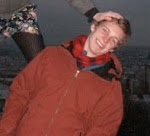
The Statue of Liberty, the widely known symbol of US Immigration, reads:
"Give me your tired, your poor,
Your huddled masses yearning to breathe free,
The wretched refuse of your teeming shore,
Send these, the homeless, tempest-tost to me,
I lift my lamp beside the golden door!"
A week ago today we received a call and learned that a Somalian man had been dropped off by Immigration and Customs Enforcement (ICE) and was stranded at a gas station. We called the pay phone at the gas station, reached Salomon, and told him that Sarah (a fellow volunteer) and I would pick him up soon. At the Chevron, when we found Salomon, a gigantic smile emerged from his thin face. As he extended his arms for hugs he said, “Hello! Thank you so much, thank you so very much! I am Salomon.”
On the drive home, Salomon explained to us part of his story. When he was in Mexico trying to cross and seek asylum, he was scammed into buying a fake ID that he was told, “always works.” Salomon spent his last $100 on an ID that he believed would complete his long journey from Africa. With the ID he walked on to the crossing bridge, waited in a long line, and eventually he nervously presented his clearly fake ID to US customs officer. Salomon spent a few weeks in jail for false documents, and then six months in immigration detention. The night we picked him up was his first taste of the United States outside of detention.
We began to tell Salomon a bit about Annunciation House. He asked curiously, “Is this place that you will take me…like detention? Will I be able to leave?” Surprised by this question Sarah answered, “no way Jose!” After we told him a bit more he humbly asked, “Well what is the cost, because I do not think that I can afford all of that.” He exuded gratefulness when we told him it was all free.
Breaking a moment of silence Salomon asked, “Excuse me, I have a question…what is it that I can do to be a productive member of this great society? I do not want to be a nuisance…I want to be helpful. When I was in detention I promised myself that never again would I be in a place like that.” Chills went up my back when I heard these words. Here is a man who has spent 6 months in detention for the ‘crime’ of escaping violence in Somalia, and somehow he holds no resentment to the US, but simply wants to be helpful. We explained to Salomon the process of acquiring a work permit, then social security, and then a state ID. He wanted to start the process when we got home that night at ten, but I said we should get some rest and start in the morning.
Since then, Salomon and I have gotten to know each other better. To my surprise one morning, Salomon began speaking Spanish with other guests in the house. When I asked him where he learned he explained, “Brother Dan, you see, when I was in detention I lived in a room with many many Mexicans. Each day I asked them to help me, and I would write Spanish and try to speak it. After a few months, I could speak with them. They were very very good people.”
Salomon later explained to me why he came to the US. In Somalia, his dad died when he was really young, and his mom died a few years ago. He was living on his own when his friends became involved with piracy. They kept encouraging him to “come on and make money with us” and he continued to refuse because he says, “ I didn’t want to be a part of any crime.” It was when Salomon got shot in the arm that he decided he needed to leave Somalia to save his life. First he took a boat for two months to South Africa. Then he flew to Bolivia, then to Guatemala. From Guatemala, he crossed the border into Chiapas, the southern state of Mexico, and took busses north until he reached Ciudad de Juaréz, El Paso’s neighbor city. Then he crossed with the fake ID.
Once in detention, Salomon lost his asylum case even though he said, “I showed them my bullet wound and told them everything, but maybe they don’t believe me.”
This story seems to be painfully ironic. Salomon could have chosen to join the pirates, and may well have been a part of an attack on a US ship. Instead, he chose to uproot his life and journey to the US, to become a “productive member of this great society.” As a nation our response was to react to his decision with six months in detention, denied asylum, and a deportation order. The irony is intensified when you compare the way Salomon was treated upon his arrival to this country to the ideals that we as a nation hoped to stand by stated on the Statue of Liberty.
Salomon only remains in the US because Somalia will not accept deportees. However, the deportation order will forever loom over him, and if things change in Somalia someday, he will be put on a plane and sent back. For now though, Salomon is working hard and smiling lots. I am incredibly humbled, inspired, and grateful to have somebody like him in this country.
Here is an interesting link to an article about a current asylum case very similar to Salomons which will have tremendous implications on future asylum seekers. http://online.wsj.com/article/

